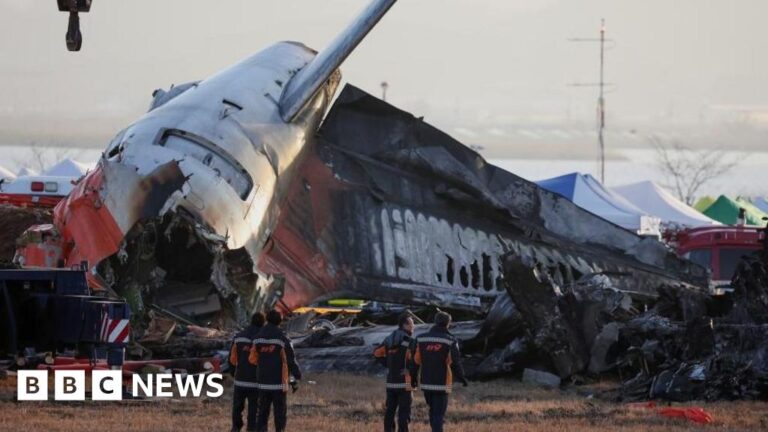Reuters
The plane landed about a third of the way down the runway without its landing gear extended.
A pre-flight inspection of a Jeju Air jetliner hours before it crashed in South Korea, killing 179 people, found “no problems”, the airline said.
“Nothing abnormal was found with the landing gear,” airline CEO Kim Yi-bae said at a news conference in Seoul, as investigations continue into determine why the wheels were not extended during the emergency landing.
The plane was flying from Bangkok when it crashed at Muan International Airport on Sunday, catching fire and killing everyone on board except two crew members after hitting a wall .
Investigators are still working to identify the victims and establish what caused South Korea’s deadliest plane crash on record.
Many questions remain unanswered and investigators are studying the role that a bird collision with weather conditions may have played.
They are also focusing on why the Boeing 737-800 did not have its landing gear down when it hit the runway shortly after 9 a.m. local time (0000 GMT) on Sunday.
Hundreds of grieving relatives are camped at Muan airport, furious that they have not yet seen the bodies of their loved ones.
So far, only some of the victims’ remains have been returned to their families. Four people were transported to funeral homes on Tuesday, but most other families are still waiting for their loved ones to be identified.
Jeju Air CEO Kim Yi-bae said the airline would cover funeral costs for those who died on board.
Responding to questions about the company’s safety procedures on Tuesday, Jeju Air CEO Kim Yi-bae said the plane would not have been allowed to take off if the maintenance team had not approved his safety.
He said its pilots were trained to regulatory standards and the company had two full flight simulators.
“We have 12.9 maintainers per aircraft, up from 12 in 2019,” he said.
“We have a strict maintenance checklist, it’s not possible to miss things. If something was missing it would be a serious problem.
“As for whether the landing gear operated properly, this is directly related to the accident investigation, and we are not in a position to know at this time.”
Mr. Kim said the airline would reduce its air traffic this winter by 10 to 15 percent, so it could do more maintenance work on the planes, but said that did not mean the company was operating too many planes. .
He added that they would increase their monitoring of weather conditions before and after flights.
Mr Kim also acknowledged that over the past five years, Jeju Air had paid the most fines and faced the most administrative actions of any Korean airline – but said the company was constantly improving its performance. safety record.
He said he was determined to strengthen the company’s security and maintenance procedures, adding: “We aim to restore your confidence in us by strengthening our security measures.”
BBC’s Jean Mackenzie reports from South Korea airport where families await news of crash victims
Mr Kim said the airline was preparing emergency compensation for the victims’ families and covering funeral costs.
The money would be released soon, he said, before the insurance process was completed. He added that company employees are on site to provide psychological support to families.
The 179 passengers on Flight 7C2216 ranged in age from three to 78, although most were between 40, 50 and 60, according to Yonhap news agency. Two Thai nationals were among the dead and the others were believed to be South Koreans, authorities said.
Many relatives are frustrated by how long the process of identifying the victims’ bodies has taken, but officials say it is a challenge because those on board were badly burned in the fire that followed the accident.
A man the BBC spoke to at the airport said his nephew and his nephew’s two sons were on a celebratory trip to Thailand to mark the end of university entrance exams. All three died during the flight.
“I can’t believe the whole family is missing,” Maeng Gi-su, 78, told the BBC. “My heart hurts so much.”
Maeng Gi-su says three family members were on board flight
The runway at Muan International Airport is to remain closed for another week while forensic teams collect more remains and debris.
Investigators began inspecting the plane’s two black boxes — the cockpit voice recorder and the flight data recorder — on Tuesday.
The second device is missing a critical connector, they say, which will make extracting data more difficult. This could prolong the search for answers as to why this plane was forced to land without its landing gear.
Officials also said they were reviewing regulations regarding a concrete barrier that the plane crashed into when it skidded past the end of the runway.

